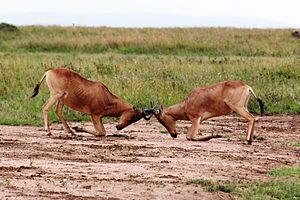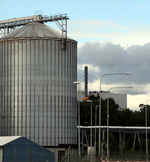| | | |
Ecology |
| Ecology (from Ancient Greek οἶκος (oîkos) 'house', and -λογία (-logía) 'study of') is the natural science of the relationships among living organisms, including humans, and their physical environment. Ecology considers organisms at the individual, population, community, ecosystem, and biosphere levels. Ecology overlaps with the closely related sciences of biogeography, evolutionary biology, genetics, ethology, and natural history. Ecology is a branch of biology, and is the study of abundance, biomass, and distribution of organisms in the context of the environment. It encompasses life processes, interactions, and adaptations; movement of materials and energy through living communities; successional development of ecosystems; cooperation, competition, and predation within and between species; and patterns of biodiversity and its effect on ecosystem processes. Ecology has practical applications in conservation biology, wetland management, natural resource management (agroecology, agriculture, forestry, agroforestry, fisheries, mining, tourism), urban planning (urban ecology), community health, economics, basic and applied science, and human social interaction (human ecology). The word ecology (German: Ökologie) was coined in 1866 by the German scientist Ernst Haeckel. The science of ecology as we know it today began with a group of American botanists in the 1890s. Evolutionary concepts relating to adaptation and natural selection are cornerstones of modern ecological theory. Ecosystems are dynamically interacting systems of organisms, the communities they make up, and the non-living (abiotic) components of their environment. Ecosystem processes, such as primary production, nutrient cycling, and niche construction, regulate the flux of energy and matter through an environment. Ecosystems have biophysical feedback mechanisms that moderate processes acting on living (biotic) and abiotic components of the planet. Ecosystems sustain life-supporting functions and provide ecosystem services like biomass production (food, fuel, fiber, and medicine), the regulation of climate, global biogeochemical cycles, water filtration, soil formation, erosion control, flood protection, and many other natural features of scientific, historical, economic, or intrinsic value. (Full article...) Selected article - Intraspecific competition is an interaction in population ecology, whereby members of the same species compete for limited resources. This leads to a reduction in fitness for both individuals, but the more fit individual survives and is able to reproduce. By contrast, interspecific competition occurs when members of different species compete for a shared resource. Members of the same species have rather similar requirements for resources, whereas different species have a smaller contested resource overlap, resulting in intraspecific competition generally being a stronger force than interspecific competition. Individuals can compete for food, water, space, light, mates, or any other resource which is required for survival or reproduction. The resource must be limited for competition to occur; if every member of the species can obtain a sufficient amount of every resource then individuals do not compete and the population grows exponentially. Prolonged exponential growth is rare in nature because resources are finite and so not every individual in a population can survive, leading to intraspecific competition for the scarce resources. (Full article...)Selected image -Credit: Nicolas Pourcelot A limule (Horseshoe crab) in the Hạ Long Bay, Quảng Ninh province, Vietnam. Horseshoe crabs are arthropods that live primarily in shallow ocean waters on soft sandy or muddy bottoms. General imagesThe following are images from various ecology-related articles on Wikipedia. Related WikiProjectsThings you can do
Entries here consist of Good and Featured articles, which meet a core set of high editorial standards.  Ambush predators or sit-and-wait predators are carnivorous animals that capture their prey via stealth, luring or by (typically instinctive) strategies utilizing an element of surprise. Unlike pursuit predators, who chase to capture prey using sheer speed or endurance, ambush predators avoid fatigue by staying in concealment, waiting patiently for the prey to get near, before launching a sudden overwhelming attack that quickly incapacitates and captures the prey. The ambush is often opportunistic, and may be set by hiding in a burrow, by camouflage, by aggressive mimicry, or by the use of a trap (e.g. a web). The predator then uses a combination of senses to detect and assess the prey, and to time the strike. Nocturnal ambush predators such as cats and snakes have vertical slit pupils helping them to judge the distance to prey in dim light. Different ambush predators use a variety of means to capture their prey, from the long sticky tongues of chameleons to the expanding mouths of frogfishes. (Full article...)Selected biography -Helena Norberg-Hodge is founder and director of Local Futures, previously known as the International Society for Ecology and Culture (ISEC). Local Futures is a non-profit organization "dedicated to the revitalization of cultural and biological diversity, and the strengthening of local communities and economies worldwide." Norberg-Hodge is the author of the international best-selling book Ancient Futures (1991), about tradition and change in the Himalayan region of Ladakh, available in multiple languages, as an ecobook and audiobook versions. She is also the author of Local is Our Future (2019), in which she advocates for localized alternatives to the global economy, particularly involving the creation of robust local food systems and democratic structures that can effectively resist authoritarianism. An outspoken critic of economic globalization, she co-founded – along with Jerry Mander, Doug Tompkins, Vandana Shiva, Martin Khor and others – the International Forum on Globalization (IFG) in 1994. She is a leading proponent of localization as an antidote to the problems arising from globalization, and founded the International Alliance for Localization (IAL) in 2014. (Full article...)Did you know (auto-generated)
Selected quote -Ecology news
Additional News Highlights
Selected publication -The African Journal of Ecology (formerly East African Wildlife Journal) is a quarterly scientific journal focused on the ecology and conservation of the animals and plants of Africa. It is published by Blackwell Publishing in association with the East African Wildlife Society. (Full article...) Related portalsMore did you know -Related articlesAssociated WikimediaThe following Wikimedia Foundation sister projects provide more on this subject:
Web resources
Discover Wikipedia using portals |















































